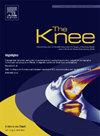Patellar morphology is different in patellofemoral instability: An MRI comparative case-control study
IF 1.6
4区 医学
Q3 ORTHOPEDICS
引用次数: 0
Abstract
Purpose
Although patellofemoral instability (PFI) affects both femoral and patellar compartments, literature provided little attention for the patellar morphology contribution on PFI. This study evaluates the patellar morphology patterns on MRI to establish their contribution in PFI.
Methods
This study retrospectively analyzes patellar MRI and X-ray measurements performed between 2018 and 2022. 50 knees with recurrent patellar dislocation were matched with 50 matched knees of ACL-reconstruction candidates with no history of patellar dislocation based on age and gender. Caton-Deschamps’ index, Wiberg’s patellar morphotype, Dejour’s trochlear dysplasia classification, sagittal patellofemoral engagement index and additional patellar cartilage and bone parameters and their relative ratio measurements were assessed in both groups.
Results
Study patients present differences in patellar morphology; a wider lateral facet (p = 0,019) and a narrower medial facet compared to the control group (p < 0,001). The subchondral patellar crest is medialized compared to the control group (p < 0,001). The cartilaginous crest measurements of the patella were not significantly different in both groups yet PFI group presents a wider Wiberg angle (p < 0,001), thus a flatter patella, compared to the control group.
Conclusion
The patella in PFI patients presents a larger lateral facet, a narrower medial facet, a flatter surface and a medialized patellar crest compared with the control group. In PFI, a rather medial patellar crest might predispose towards a greater patellar tilt and destabilize the already compromised patellar-trochlear groove congruence. PFI is a multifactorial disease and both trochlea and patella play a role in its manifestation, thus, literature should address patellar morphotype contribution in patellofemoral instability.
Level of Evidence: Level III.
髌骨股骨不稳的髌骨形态不同:磁共振成像对比病例对照研究。
目的:虽然髌骨股骨不稳(PFI)会影响股骨和髌骨,但文献很少关注髌骨形态对 PFI 的影响。本研究评估了 MRI 上的髌骨形态模式,以确定其在 PFI 中的作用:本研究回顾性分析了2018年至2022年间进行的髌骨MRI和X光测量。根据年龄和性别,将 50 个复发性髌骨脱位的膝关节与 50 个无髌骨脱位史的前交叉韧带重建候选者的匹配膝关节进行配对。对两组患者的Caton-Deschamps指数、Wiberg髌骨形态类型、Dejour髌骨发育不良分类、矢状髌股关节啮合指数以及其他髌骨软骨和骨骼参数及其相对比率测量进行评估:与对照组相比,研究组患者的髌骨形态存在差异:外侧切面更宽(p = 0.019),内侧切面更窄(p 结论:PFI 患者的髌骨形态与对照组不同:与对照组相比,PFI 患者的髌骨外侧切面较大,内侧切面较窄,表面较平坦,髌骨嵴内侧化。在 PFI 患者中,髌骨嵴偏内侧可能会导致髌骨更加倾斜,并破坏已经受损的髌骨-蝶骨沟一致性的稳定性。PFI是一种多因素疾病,跗关节和髌骨都在其表现中起作用,因此,文献应探讨髌骨形态在髌股不稳定中的作用:证据等级:三级。
本文章由计算机程序翻译,如有差异,请以英文原文为准。
求助全文
约1分钟内获得全文
求助全文
来源期刊

Knee
医学-外科
CiteScore
3.80
自引率
5.30%
发文量
171
审稿时长
6 months
期刊介绍:
The Knee is an international journal publishing studies on the clinical treatment and fundamental biomechanical characteristics of this joint. The aim of the journal is to provide a vehicle relevant to surgeons, biomedical engineers, imaging specialists, materials scientists, rehabilitation personnel and all those with an interest in the knee.
The topics covered include, but are not limited to:
• Anatomy, physiology, morphology and biochemistry;
• Biomechanical studies;
• Advances in the development of prosthetic, orthotic and augmentation devices;
• Imaging and diagnostic techniques;
• Pathology;
• Trauma;
• Surgery;
• Rehabilitation.
 求助内容:
求助内容: 应助结果提醒方式:
应助结果提醒方式:


